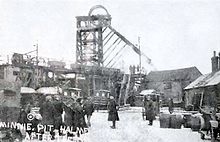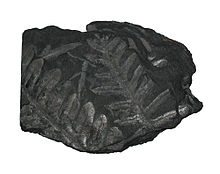- Miners (poem)
-
Miners is a poem by Wilfred Owen. He wrote the poem in Scarborough in January 1918, a few weeks after leaving Craiglockhart War Hospital where he had been recovering from shell-shock. Owen wrote the poem in direct response to the Minnie Pit Disaster in which 156 miners died.
Contents
Background
After his discharge from Craiglockhart and a short spell of leave, Owen rejoined his army unit (the 3/5th battalion the Manchester Regiment) in Scarborough. While his men were in stationed at Burniston Road Barracks a mile north-west of the town, Owen and other officers were billeted in the Clarence Gardens (now the Clifton) Hotel; Owen was the mess secretary.[1][2] Owen had a unique room in the hotel: he occupied the five-windowed turret on the 5th floor, directly overlooking the sea.[3]
He wrote Miners in under an hour[4] in response to the Minnie Pit Disaster of 12th January 1918 in which 156 men and boys lost their lives as a result of a firedamp explosion, including 40 pit-lads under 16. Owen was unusually well-acquainted (for someone with a grammar school education) with working-class miner types. Aged nineteen, he had met a Northumberland pit-lad who made a particular impression on him at a nonconformist convention in Keswick in 1912.[5] Also, many of the men in his platoon had worked down the Lancashire pits before the war: in 1916, Owen had described his men as[6]
"hard-handed, hard-headed miners, dogged, loutish, ugly. (But I would trust them to advance under fire and to hold their trench;) blond, coarse, ungainly, strong, 'unfatiguable', unlovely, Lancashire soldiers, Saxons to the bone.
In addition Owen was a keen geologist who had collected rocks and minerals since his youth, and in Miners he uses phrases like "smothered ferns" and "frond-forests", redolent of the imprints of fossil plants in coal.
Poem
The opening stanzas evoke the poet gazing into the fire imagining a primeval forest older than myth, "before the fauns". But his traumatic experiences on the Western Front intrude on his somewhat romantic meditation: "Wrote a poem on the Colliery Disaster: but I get mixed up with the War at the end. It is short, but oh! sour."[7] The gently hissing coals recall the moans of the dying miners "writhing for air"; and Owen intertwines their death with that of soldiers at the front, imagining heaps of white bones in the fire's ashes and "muscled bodies charred". Yet in the future, the centuries will still doze by the fire, its coals themselves formed out of "rich loads", of groans and toil in the dark pits of war. The coming years, preserved in their rooms like insects in amber will be oblivious of the millions of dead lads - soldiers and miners - buried under the earth.
For a projected volume of his work, Owen gave the poem the subtitle: How the future will forget the dead in war.[8]
MINERS by Wilfred Owen
There was a whispering in my hearth,
A sigh of the coal,
Grown wistful of a former earth
It might recall.
I listened for a tale of leaves
And smothered ferns,
Frond-forests, and the low sly lives
Before the fauns.
My fire might show steam-phantoms simmer
From Time's old cauldron,
Before the birds made nests in summer,
Or men had children.
But the coals were murmuring of their mine,
And moans down there
Of boys that slept wry sleep, and men
Writhing for air.
And I saw white bones in the cinder-shard,
Bones without number.
Many the muscled bodies charred,
And few remember.
I thought of all that worked dark pits
Of war, and died
Digging the rock where Death reputes
Peace lies indeed.
Comforted years will sit soft-chaired,
In rooms of amber;
The years will stretch their hands, well-cheered
By our life's ember;
The centuries will burn rich loads
With which we groaned,
Whose warmth shall lull their dreaming lids,
While songs are crooned;
But they will not dream of us poor lads,
Left in the ground.Publication
Owen sent the poem to The Nation in the evening of the day he finished it.[9] The proofs arrived while Owen was preparing to attend Robert Graves' wedding (on 23rd January at St. James's Church, Piccadilly).[10]
Miners was published on 26th January 1918, one of only five poems by Owen published in his lifetime.[11][Note 1] The cheque arrived on 14th February. Owen, in one of his many letters to his mother, said he was "satisfied with the Two Guineas that half-hour's work brought me."[4]
Notes
- ^ The four other poems by Owen which appeared in print during his lifetime were Song of Songs and The Next War published in The Hydra, and Hospital Barge and Futility published in The Nation, 15th June 1918.
References
- ^ Collected letters, p. 508
- ^ Selected letters, p. 295n
- ^ Collected letters, p. 516
- ^ a b Selected letters, p. 312
- ^ Gibson (2001), p. 202
- ^ Collected letters, p. 395
- ^ Blunden (1967), p. 104
- ^ Kerr (1994), pp. 104-5
- ^ Independent, 2011-11-10
- ^ Selected letters, p. 309
- ^ Hibberd (2003), p. 367
Sources
Bell, John, ed (1985). Wilfred Owen: Selected letters (revised ed.). Oxford University Press. ISBN 9780192819147. Blunden, Edmund, ed (1967). The poetry of Wilfred Owen. London: Chatto & Windus. Farley, Paul. "Wilfred Owen: Journey to the trenches". The Independent, Friday, 10th November 2006. http://www.independent.co.uk/news/people/profiles/wilfred-owen-journey-to-the-trenches-423593.html. Retrieved 26th September 2011. Gibson, John (2001). "Mother's boy and stationmaster's son". In Quinn, Patrick J. & Trout, Steven. The literature of the Great War reconsidered: beyond modern memory. Basingstoke: Palgrave Macmillan. ISBN 9780333764596. Hibberd, Dominic (2003). Wilfred Owen: a new biography. Lanham, MD: Ivan R. Dee. ISBN 9781566634878. Kerr, Douglas (1994). The works of Wilfred Owen. Ware, Hertfordshire: Wordsworth Editions. ISBN 9781853264238. http://books.google.co.uk/books?id=qO350DeGItwC&pg=PA104. Owen, Harold & Bell, John, ed (1967). Wilfred Owen: Collected letters. Oxford University Press. External references
- Clifton Hotel, Scarborough for sale, 2011
- Miners at the Wilfred Owen Associaton
- Miners:autograph manuscript and full text at Oxford University First World War poetry archive
"1914" · "A New Heaven" · "A Terre" · "Anthem for Doomed Youth" · "Apologia Pro Poemate Meo" · "Arms and the Boy" · "As Bronze may be much Beautified" · "Asleep" · "At a Calvary near the Ancre" · "Beauty" · "But I was Looking at the Permanent Stars" · "Conscious" · "Cramped in that Funnelled Hole" · "Disabled" · "Dulce et Decorum est" · "Elegy in April and September" · "Exposure" · "Futility" · "Greater Love" · "Happiness" · "Has Your Soul Sipped?" · "Hospital Barge" · "I Saw His Round Mouth's Crimson" · "Insensibility" · "Inspection" · "Le Christianisme" · "Mental Cases" · "Miners" · "Music" · "S. I. W." · "Schoolmistress" · "Six O'Clock in Princes Street" · "Smile, Smile, Smile" · "Soldier's Dream" · "Sonnet On Seeing a Piece of our Heavy Artillery Brought into Action" · "Spells and Incantations" · "Spring Offensive" · "Strange Meeting" · "The Calls" · "The Chances" · "The Dead-Beat" · "The End" · "The Kind Ghosts" · "The Last Laugh" · "The Letter" · "The Next War" · "The Parable of the Old Man and the Young" · "The Roads Also" · "The Send-off" · "The Sentry" · "The Show" · "The Wrestlers" · "Training" · "Uriconium An Ode" · "Wild With All Regrets" · "With an Identity Disc"Categories:- Poetry by Wilfred Owen
- 1918 poems
- British poems
- World War I poems
Wikimedia Foundation. 2010.


